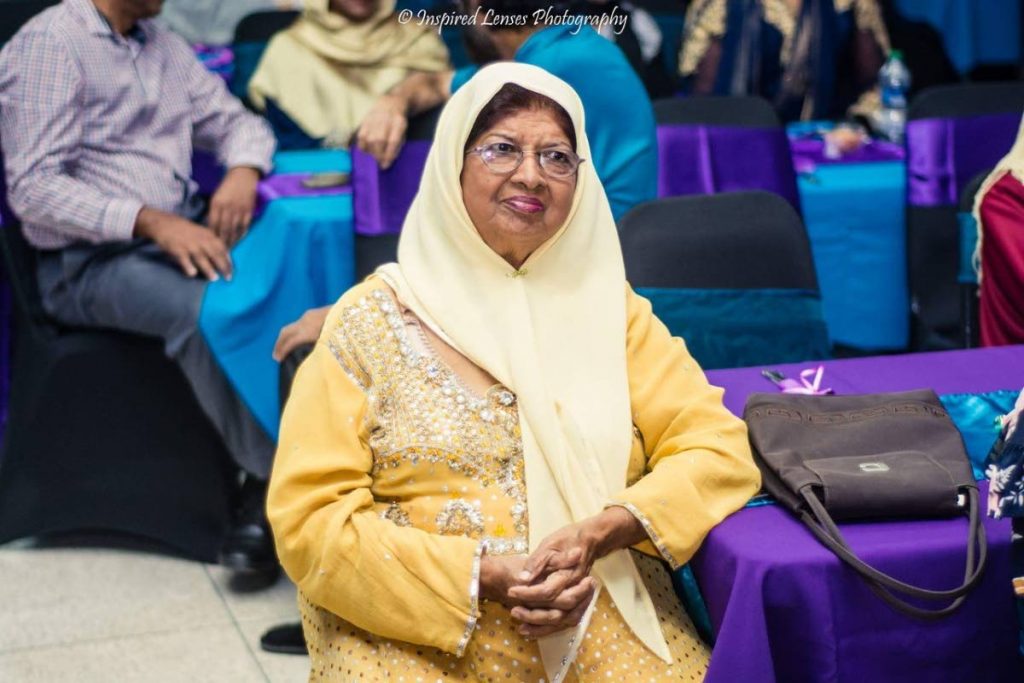When covid19 hit home

TAUREEF MOHAMMED
Despite working on the frontlines for almost a year, I was still unprepared for it. On January 14, my grandmother became the 130th person to die from covid19 in TT.
Having lost both her parents as a baby, she grew up as an orphan in the compound of the Jama Masjid on Queen Street, Port of Spain, before settling down in El Socorro, where she spent most of her life and raised her family. She was a social butterfly who, with her cheerful disposition and
qaseeda renditions, lifted everyone’s spirits.
The pandemic, as merciless as it has been to the elderly, did not stop her from being Nanny, albeit from a distance. She continued to bake treats, cook meals, and made surprise drive-by birthday visits. With her smartphone she explored the world through Youtube and, with help from my cousin, even joined WhatsApp, her profile picture a black-and-white portrait from the sixties.
Nanny knew she was in the final chapter and she was prepared. When I graduated from medical school she told me a doctor was frequently the last person someone saw in this world before he/she met God, and that was exactly how she left.
But for the rest of us, covid19 upended everything. We had lost loved ones before, but this was the first time we were losing a relative to covid19 and no one, including those of us in healthcare, knew how to navigate it.
From the time she was whisked away in the ambulance at Mt Hope, it was clear this was not going to be an ordinary hospital stay – if something like that even exists. Restricted from going close to her to provide comfort, my mom scribbled a letter and handed it to the ambulance driver, hoping he would get a moment to read it to her.
When I asked what she had written, all she could remember was the beginning and ending: “My beloved mother,” and “We love you.”
In Arima Hospital, we were able to communicate with her through a video call. She appeared confused, but in the end when she waved and blew kisses to the camera, we knew Nanny was still there.
The situation intensified at Couva Hospital, where she declined, and the reality of what my grandmother was going through hit me.
For patients, the hospital is an eerie place. Everything – the people, the surroundings, the beds, the clothes, the sounds, the scent, the schedule, the food – is unfamiliar. Now add to that covid19 visitor restrictions, PPE, and the cacophony of ICU machines – the result is a dystopia from a sci-fi movie. So when my mom told me Nanny had been transferred to the ICU, I broke down.
The staff at Couva was acutely aware of the estrangement covid19 caused. They called the family frequently not just to offer a medical update, but to bridge the gap covid19 created. When one of the doctors, determined to relay the most minute detail, said Nanny uttered something about “fry aloo and roti,” we knew she was still there.
At the request of the family, they also played the Quran for her. One night shortly after 8pm, one of the junior doctors called my mom just to say the Quran was playing. My mom slept well that night. And the following morning my grandmother died.
Unfortunately there will be more covid19-related deaths in TT. If one of your loved ones is being admitted to hospital – whether it’s for covid19 or not – try to keep connected, as difficult as it might be. Write them letters, give them pictures to keep at the bedside, teach them how to use a smartphone.
Don’t feel shy about making requests or offering suggestions to the hospital staff. Although many describe them as heroes, healthcare workers do feel a tremendous sense of helplessness when it comes to covid19. So when families have suggestions on how to comfort a patient with covid19, they are eager to listen.
When my grandmother passed, I felt a sense of relief for her. The horrible but thankfully short sci-fi movie had ended.
But more than that, I felt happy knowing she was now a butterfly again, no longer trapped in a cocoon by covid19.
To all the healthcare workers who were involved in her care, as Nanny would say, “Allah bless all of you.”

Comments
"When covid19 hit home"